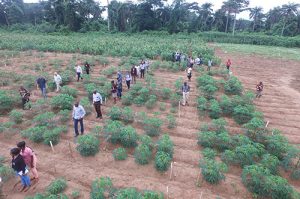Cash scarcity ruffles agriculture as farmers,traders record poor sales
February 13, 2023739 views0 comments
By Onome Amuge
The CBN’s cash swap policy deadline and the resultant cash crunch across the country has dealt a severe blow on the agriculture sector as many farmers have been forced to sell their commodities at almost at giveaway prices just to stay afloat against a rocky economic situation.
Farooq Mudi, president of the All Farmers Association of Nigeria (AFAN), confirmed this in a recent interview with newsmen where he stated that farmers are crashing prices of their commodities to raise funds to sustain operation costs and in preparation for the next planting season.
According to Mudi,farmers are selling their produce below the cost of production because they need to buy fertiliser and pay labourers. He also noted that labourers mostly do not have bank accounts and would rather go to farms where they would be paid cash.
Read Also:
Also commenting on the worrisome impact of the naira scarcity on the agriculture sector, Ismail Olawale, a fellow at the National Agriculture Extension and Research Liaison Services (NEARLS), bemoaned that the cash scarcity challenge is crippling Nigeria’s food chain.
According to Olawale, although the CBN’s policy is aimed at promoting a cashless economy, most Nigerian farmers reside in rural areas where cash is a dominating form of transaction. He also noted that the farmers are yet to obtain the necessary technology required for cashless society.
In his words: “The average Nigerian farmer resides in the rural areas and about 60 per cent of the rural areas have no bank facilities. What is mainly available for them are the PoS centres and other mobile apps that are not well regulated. These are not reliable banking systems.
“Sometimes, these PoS operators are mischievous and use the current Naira scarcity to cheat these farmers. They make these exchanges miserable for these farmers. The situation exposes farmers to counterfeit and fake money. Which makes farmers run at a loss.”
Olawale observed that the policy has grossly affected the movement of farmers and also crippled agricultural activities of many who are sometimes left stranded as a result of restricted cash flow to transport their products before they perish.
Market surveys across some markets in the South-west region of the country indicated that grain prices dropped by about 50 per cent as farmers became desperate to sell off their produce while battling the ripple effects of the naira crisis. Reports show that the price of maize declined from N27, 000 per bag to N13, 000 to 15,000, depending on if the customer is paying by cash or through digital money transfer.
The News Agency of Nigeria (NAN), in a related report, noted that prices of grains and other food items have dropped significantly in the northern region of the country.
The report observed that the prices of staples including maize, guinea corn, millet and beans have gone down compared to what obtained the previous month of January.
Haruna Abdullahi, a grains seller based in Katsina said that a bag of maize stood at about N19,000 in most markets as against the old price of N24,000. He added that a bag of guinea corn sold for N14,000 and below, depending on the quality, compared to the old price of N18,000.
According to Abdullahi, prices of food items are even cheaper in major markets like Dandume, Bakori, Danja and other grains-producing areas of the state which are harder hit by the impact of the cash scarcity.
Despite the worrisome decline in the prices of food commodities at major farm produce markets across the country, sellers have been forced to contend with low patronage due to the challenges experienced by both traders and customers alike in accessing cash.
Joshua Onuche, a poultry farmer and founder, Layonder Farm, Nasarawa State, who spoke to Business A.M, said the cash scarcity has resulted in low sales due to the reduction in the number of customers.
Onuche, who attributed the low patronage in his poultry business to the limited cash flow, explained that many of his customers only make purchases based on the level of cash in their possession.
Questioned on why he hasn’t been able to maximise the opportunities in digital/online transactions, Onuche explained that such transactions had been riddled with many glitches, hindering smooth transaction flow.
“A lot of digital transactions over here have been poor as some of the mobile apps and related services do not produce the desired results. There are times customers make money transfers which take hours to reflect in the payment account. Other times,they make transfers which are not successful despite being debited and this has caused more harm than good to my business,” he said.
To this end, Onuche called on the CBN to enable cash flow by allowing the circulation of both the old and new notes and further extending the cash swap deadline.

